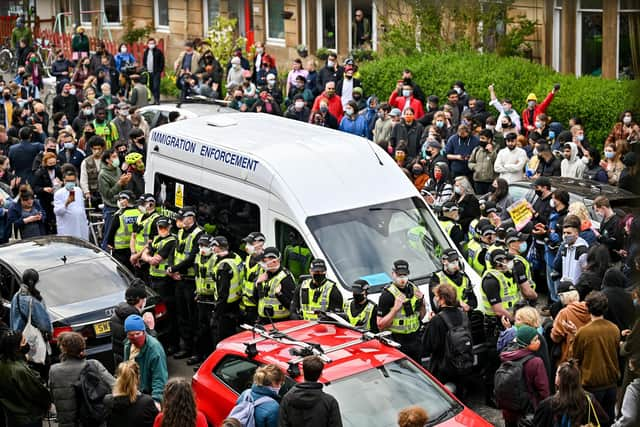Kenmure Street: Protest against Glasgow deportation attempt was impressive but SNP support raises serious concerns about the rule of law – John McLellan
Its origin, which I had to look up, is from the Latin “mobile vulgus” which I now know means "fickle common people", which is reflected in the Chambers Dictionary definition as “the mobile or fickle common people; the vulgar, the rabble; a disorderly crowd, a riotous assembly”. The verb to mob is “to crowd around, especially with vexatious curiosity or attentions". The Oxford definition is “a large crowd of people, especially one that may become violent or cause trouble”.
Apart from the Mafia, perhaps the best known was the infamous Paris Mob, a generic term for unruly French folk, from the St Bartholomew’s Day Massacre of Protestants in 1572 to the first Fronde of 1648 which convinced Louis XIV that he so needed a place in the country he built Versailles, and the storming of the Bastille in 1789.
Advertisement
Hide AdAdvertisement
Hide AdThe Chambers definition is old-fashioned to say the least, and in these times of Extinction Rebellion no assumptions can be made about the class, upbringing or educational background of any gathering intent on ignoring the rule of law, so when is a mob not a mob, but a gathering with noble intent?
On Thursday, mob became a pejorative for the crowd which surrounded a UK Border Force van in Pollokshields to prevent the removal of two men suspected of being in the country illegally.
With the endorsement of the Scottish government and every SNP supporter on social media, this was not a mob but justified community intervention.
Alerted by social media to the fact that two men of Asian origin were being lifted in Glasgow’s most multi-cultural district, a crowd gathered and as a circle of police officers faced a growing protest, with one demonstrator squeezing himself under the van, the police commander took the decision to release the men and cool the situation. But within hours the political temperature reached boiling point.
“This action was unacceptable,” tweeted First Minister Nicola Sturgeon. “To act in this way, in the heart of a Muslim community as they celebrated Eid, and in an area experiencing a Covid outbreak was a health and safety risk.”


This was repeated by Scottish Labour leader Anas Sarwar, who said: “It is particularly unacceptable that this is happening during a pandemic, in an area that has a spike in cases and on the day of Eid.”
Scottish Justice Secretary Humza Yousaf said the situation should not have arisen and added: “I abhor Home Office immigration policy at the best of times, but to have taken the action they have today is at best completely reckless, and at worst intended to provoke.”
MP Kirsty Blackman, until recently the SNP’s deputy leader in Westminster, went further by suggesting the party was an active participant. “We have achieved something today,” she said. “Just imagine what we can do with independence.”
Advertisement
Hide AdAdvertisement
Hide AdSet aside the specifics of the case, it is quite something when both the First Minister and the leader of the Scottish Labour Party are saying that the operation should not have taken place during a major religious festival.
Apart from the men not being Muslim, by extension it means the police need to think twice about arresting Christians at Easter or Jews at Passover. But if anyone was being reckless it was Mr Yousaf, by suggesting it was a deliberate provocation, with undertones of racism, which risked ramping up tension against officers when the commander on the ground was trying to do the opposite.
Mr Yousaf went further, inferring that the operation was sanctioned at the highest level on “a day the UK government would have known the Scottish government and MSPs would be distracted by parliamentary process".
It’s unlikely that Border Force knew or cared what MSPs were doing when the operation was planned, but both Ms Sturgeon nor Mr Yousaf are aware that the laws they pass rely on enforcement, and that law officers’ duty is to carry out instructions which by their nature are always political.
Effectively, they were delegitimising the rule of UK law, and while they are entitled to oppose, they might as well have said that UK legislation with which the SNP disagrees should not be enforced in Scotland. Who needs an independence referendum if the message from the Scottish government to enforcement agencies is that UK law has no writ here?
Endorsing and excusing obstruction of the law encourages the belief that active resistance is permissible if you don’t like it, and the effect of political encouragement for the Community Charge/Poll Tax campaign 30 years ago was to hit council budgets and services.
The Suffragettes are regularly cited as justification for civil disobedience, and while it’s true that protest is part of democracy and policing in an open society can only be by consent, the system is unsustainable if law-makers themselves help create the conditions for defiance.
The absence of any criticism of the people for gathering during the pandemic was also notable; it was apparently Border Force’s fault for provoking the assembly, not the people for gathering.
Advertisement
Hide AdAdvertisement
Hide AdIt was a bit like blaming Rangers for winning the league, not the supporters for gathering outside Ibrox Park to celebrate. Contrast Ms Sturgeon’s reaction this week with what she said then, before trouble flared: “Everyone has made so many sacrifices in the past year and seeing a minority risk our progress is infuriating and disgraceful. It is deeply unfair to the entire country, and the police have a hard enough job already.”
This week’s display of community power in action was undoubtedly impressive, but as a party of government, the SNP either supports law and order or it doesn’t.
